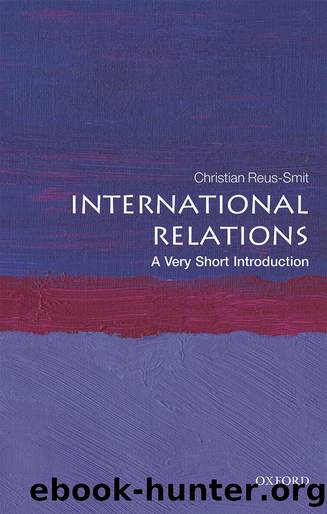International Relations by Christian Reus-Smit

Author:Christian Reus-Smit [Reus-Smit, Christian]
Language: eng
Format: epub
ISBN: 9780192590510
Publisher: OUP Oxford
Published: 2020-02-20T00:00:00+00:00
Economies and political authority
While dominant economic theories imagine a pure economy that is not structured by, and dependent upon, political authority, it is near impossible to identify such a thing in the real world. Even the most basic forms of exchange depend on social norms—shared ideas of rightful ownership and prohibitions on theft, for example—and although such norms are at times informal, most societies codify them in law, backed by legitimate political power. Money provides another example of the dependence of economies on political authority. It is so much a part of our daily lives that we can easily think of it as a natural, material thing. But money is a social institution, based on shared understandings that 100 yuan, rupees, euros, or US dollars have certain values, exchangeable for certain goods. Moreover, it is a social institution backed by states, which mint notes and coins, uphold them as legal tender, and intervene in markets to protect their value. This is why the oldest discovered coins through to the most recently minted bank notes bear (as Figure 4 shows) the imprints of emperors, monarchs, presidents, or national symbols (from eagles to kangaroos). Another example concerns market competition, often seen as an entirely natural process. Yet one of the most compelling insights of Marxist theorists, most famously the Russian revolutionary Vladimir Lenin, is that capitalism tends toward monopolies, in which markets become dominated by ever fewer and more powerful companies (think of Amazon and Google today). Ensuring competition requires political intervention, and today most states have agencies and laws to prevent, and at times break up, monopolies. Finally, markets frequently fail to deliver desirable social outcomes, and political action is often required to shape or constrain economic forces to achieve particular ends. Markets in firearms are a good example. Unregulated, such markets lead to the proliferation of ever more dangerous weapons, resulting in escalated violence and increased fatalities (the experience of the US being a case in point).
4. Queen Victoria on British East Africa Protectorate coin, 1898.
Download
This site does not store any files on its server. We only index and link to content provided by other sites. Please contact the content providers to delete copyright contents if any and email us, we'll remove relevant links or contents immediately.
| Arms Control | Diplomacy |
| Security | Trades & Tariffs |
| Treaties | African |
| Asian | Australian & Oceanian |
| Canadian | Caribbean & Latin American |
| European | Middle Eastern |
| Russian & Former Soviet Union |
The Secret History by Donna Tartt(19025)
The Social Justice Warrior Handbook by Lisa De Pasquale(12182)
Thirteen Reasons Why by Jay Asher(8882)
This Is How You Lose Her by Junot Diaz(6869)
Weapons of Math Destruction by Cathy O'Neil(6260)
Zero to One by Peter Thiel(5782)
Beartown by Fredrik Backman(5733)
The Myth of the Strong Leader by Archie Brown(5491)
The Fire Next Time by James Baldwin(5422)
How Democracies Die by Steven Levitsky & Daniel Ziblatt(5209)
Promise Me, Dad by Joe Biden(5139)
Stone's Rules by Roger Stone(5078)
A Higher Loyalty: Truth, Lies, and Leadership by James Comey(4946)
100 Deadly Skills by Clint Emerson(4911)
Rise and Kill First by Ronen Bergman(4772)
Secrecy World by Jake Bernstein(4736)
The David Icke Guide to the Global Conspiracy (and how to end it) by David Icke(4696)
The Farm by Tom Rob Smith(4500)
The Doomsday Machine by Daniel Ellsberg(4480)
